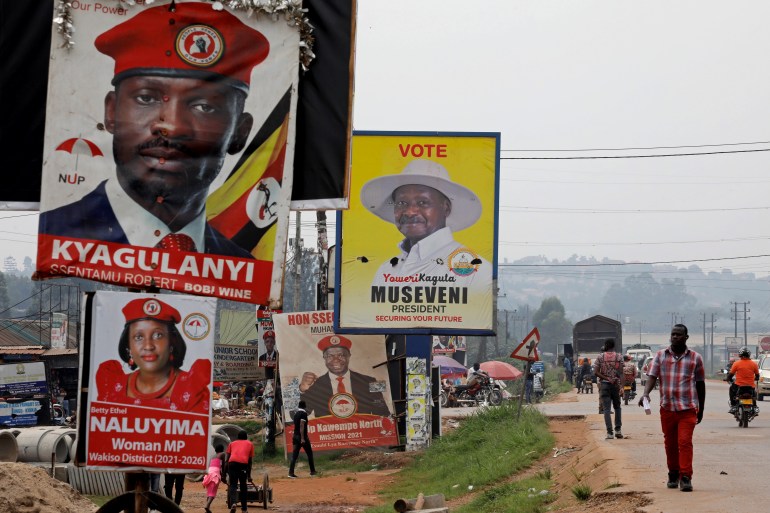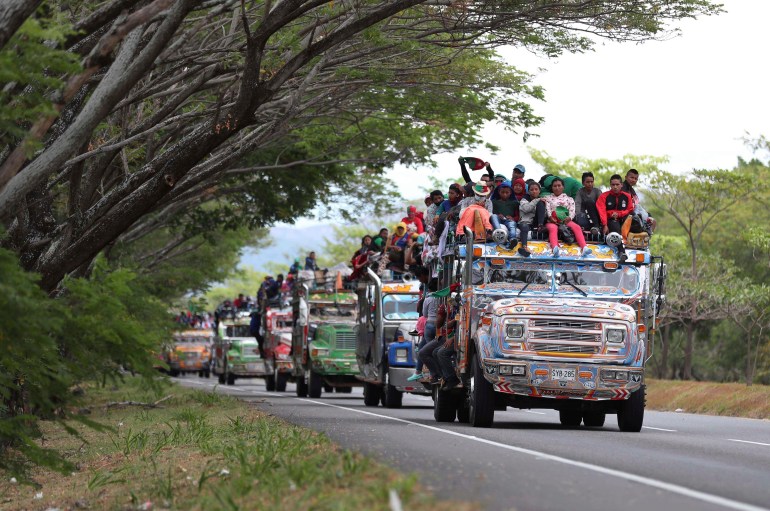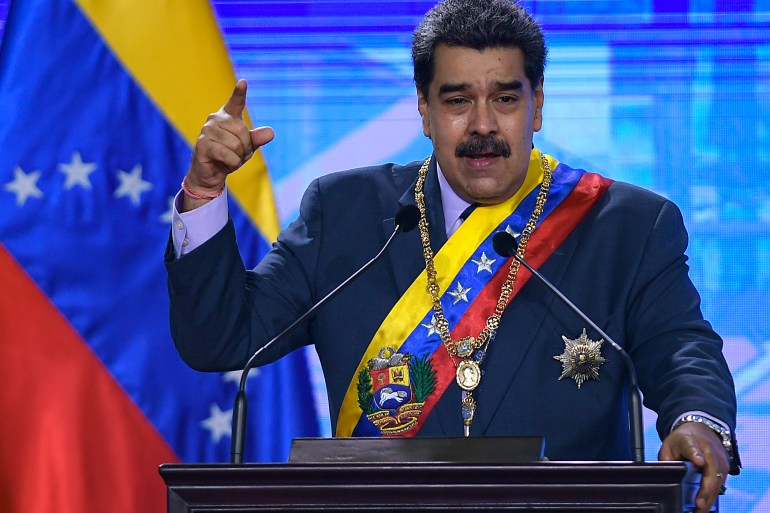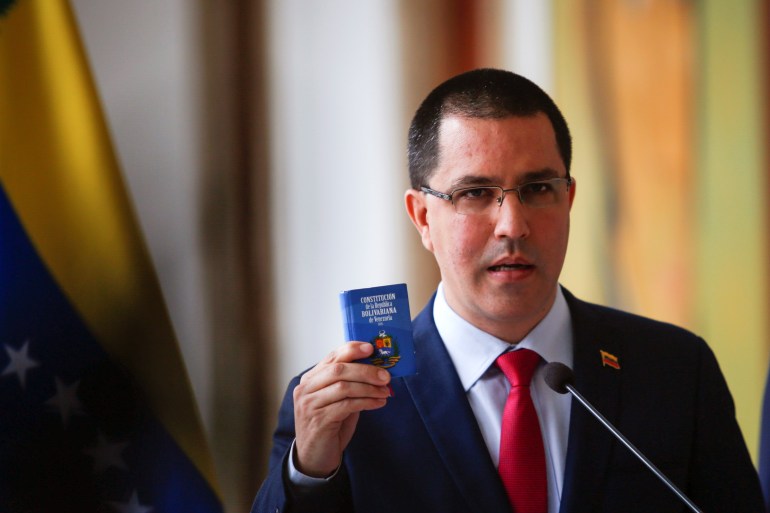Despite his recent disputed election win, the tactics that kept the rebel-turned politician in power for decades may be starting to lose their efficiency.
Rosebell Kagumire
is a feminist writer, award-winning blogger and social-political commentator.
22 Jan 2021

In Uganda, history is once again repeating itself – a strongman is stubbornly and violently clinging to power in the face of growing demands for a peaceful transition, and shamelessly warning the nation that his exit would bring nothing but chaos and bloodshed.
Indeed, Uganda’s January 14 presidential election, which saw incumbent Yoweri Kaguta Museveni re-elected, was an election held at gunpoint in the cover of darkness.
Days before the polls, Museveni not only ordered a full shutdown of the country’s internet but also demonstrated the military might of his dictatorial regime by filling Kampala’s streets with tanks and skies with helicopters. His message to the voters was clear: “it is either me, or war”.
The rebel-turned-politician, who has been in power since 1986, was even more determined to not allow Ugandans to vote freely in this election, as for the first time in decades his main challenger was not his old comrade and former personal doctor, Kizza Besigye.
This year, Museveni was running against a dynamic, much younger opponent named Robert Kyagulanyi Ssentamu who has the support of millions of young Ugandans desperate for change. Known by his stage name Bobi Wine, the former singer entered Uganda’s political scene in 2017 and has since become the most significant threat to Museveni fulfilling his apparent desire to remain president for the rest of his life.
So, as the country geared up for the 2021 elections, Museveni had to come up with new ways to deter millions of young Ugandans armed with their mobile phones from tallying results or exposing in real-time the expected repeat of widespread electoral malpractices that have marred previous elections.
During the last election, he had ordered a social media shutdown. This time, he went all in and ordered a total internet blackout to allow his state machinery to work in complete darkness, with no information about the election reaching Ugandan citizens.
Museveni’s attempts to secure a victory at any cost started long before the polls actually opened. During the entire campaign period, he used state powers in his service to try and intimidate Bobi Wine, other leading opposition figures like Forum for Democratic Change’s Patrick Oboi Amuriat, and their supporters into submission. His regime also used restrictions put in place to stem the spread of COVID-19 to target opposition rallies and prevent his rivals from connecting with voters across the country.
Bobi Wine has been arrested and detained under trumped-up charges three times in the months leading up to the election. His second arrest in mid-November, for allegedly breaking COVID-19 gathering restrictions, led to widespread protests across the country. As Bobi Wine’s supporters took to the streets in urban centres to demand free and fair elections, security forces responded with bullets and tear gas. According to Museveni himself, at least 54 people lost their lives in these state-sponsored episodes of violence.
As national newspapers chronicled stories of those who lost their lives, it became clear that the military had indiscriminately fired bullets on civilian crowds. The youngest victim of the violence was a 15-year-old boy named Amos Segawa.
Things did not get any better on election day. Security forces arrested more than 30 Ugandan election observers, and as a result, the nation did not have the opportunity to receive impartial, reliable information on the vote count. Coupled with an excessive military presence on the streets, polling stations, and data centres, most Ugandans lost any remaining hope they had for a free and fair election.
As authorities in Kampala started to announce preliminary results without offering any explanation as to how they gathered them, Bobi Wine declared the electoral process a rigged “sham” and announced his intention to contest the results legally. This led to Museveni’s security forces raiding his compound, arresting his security guards, and effectively imprisoning him in his own house alongside his wife and young child. Hundreds of Bobi Wine supporters have also been illegally detained across the country.
In the end, ignoring growing concerns about the legitimacy of the election, the Electoral Commission of Uganda announced in a televised news conference that Museveni had won the race with 58.64 percent of the vote.
With Bobi Wine still besieged in his home and tanks still rolling in Kampala’s streets, the commission’s announcement failed to convince many Ugandans of the legitimacy of Museveni’s victory.
Nevertheless, the incumbent welcomed the results in a televised address to the nation and defiantly claimed that the 2021 presidential polls may eventually turn out to be Uganda’s “most cheating-free election” since independence.
Museveni has a long history of strong-arming the Ugandan people, the opposition, and the international community into looking past allegations of election fraud and rigging. In 2016, for example, he succeeded in convincing the country of his electoral victory’s legitimacy by besieging his then-rival Besigye’s house for more than 40 days.
However, the tactics that kept him in power for decades may be starting to lose their efficiency.
Sure, he “won” the election. Sure, Bobi Wine’s supporters are currently somewhat subdued, as they have no way of communicating with the imprisoned opposition leader save for occasional videos and photos from his house posted online since the partial restoration of the internet on January 18. But the president should not confuse this helpless silence with acceptance.
Museveni may have secured another term as president in an election designed to keep him in power, but his party still suffered significant loses in the very same polls. About 30 MPs, including many cabinet ministers and the vice president, lost their seats, largely to candidates from Bobi Wine’s National Unity Platform (NUP). Moreover, Bobi Wine’s party trounced the ruling National Resistance Movement (NRM) in the Buganda region, including in the Luwero triangle where Museveni started his guerrilla war that propelled him to power 35 years ago.
Despite all the violence and intimidation, young Ugandans still went to the polls wherever they could and demonstrated that they are not willing to give up on their fight to unseat the old guard to pave the way for a better future.
Museveni’s military prowess secured him a sixth term as president, but did not prove sufficient to make the Ugandan people see him the way they did three decades ago: someone who can inject new hope into a country in desperate need of change.
Museveni and his government are clearly aware that despite their so-called electoral victory, they no longer have the support of a clear majority of the Ugandan people. And they know this lack of legitimate public support could easily turn the international community against them.
This is why they accused Washington of trying to “subvert” the election when the US ambassador to Uganda attempted to visit Bobi Wine at his home.
The Museveni regime is now cornered, irritated and clearly struggling to discern who is a friend and who is a foe. The regime can continue to co-opt all structures at home in Museveni’s favour to ensure he is never subjected to a free and fair election, however, it cannot stay in power if the world turns its back to the longtime Ugandan leader.
My people have a saying that goes “even the best dancer on the stage must retire sometime”. Museveni clearly sees himself as the best dancer, but he is unwilling to listen to other people’s opinions and accept that the time has come for him to retire.
The fact that he does not have enough confidence in himself to stand against young opponents in free and fair elections alone is proof that his departure is long overdue.
Today, as they literally look down the barrel of a gun, young Ugandans are more determined than ever to build a new Uganda. Those who have long been reluctant to back the opposition in fear of what might happen in Museveni’s absence are now not in the majority, as the changing demographics of the country has tilted the balance in favour of the youth. The regime’s ever more blatant human rights abuses, militarism and lies are not going to help Museveni much longer.
Uganda is at a tipping point – and anyone who does not want to see the country engulfed in yet another violent power struggle should start supporting non-violent efforts to demilitarise Ugandan politics, and pressuring Museveni to deliver the peaceful transition of power the country has been waiting for since its declaration of independence in 1962.
The views expressed in this article are the author’s own and do not necessarily reflect

Rosebell Kagumire She is the curator and editor of African Feminism- AF,











